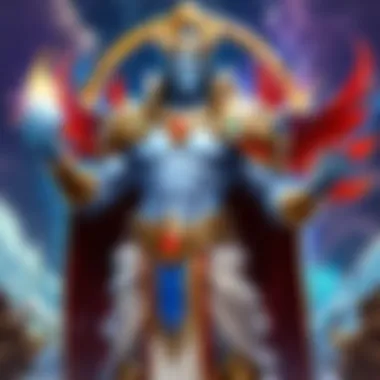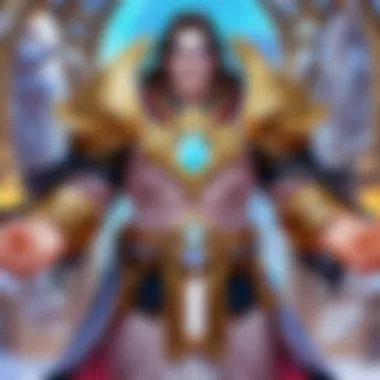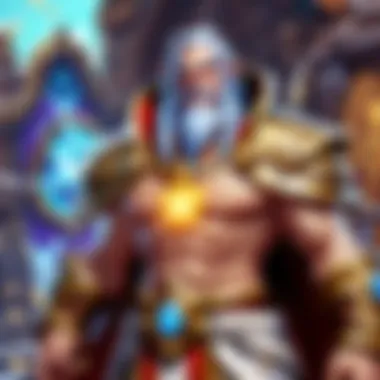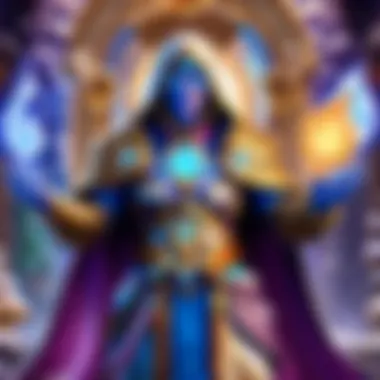Exploring the Multifaceted Nature of Divine Spirit


Intro
The exploration of the divine spirit encompasses a vast and intricate landscape of thoughts, beliefs, and practices. This discourse intertwines historical narratives, theological interpretations, and contemporary cultural phenomena. In various traditions, the divine spirit has been understood as an essence that transcends human understanding, shaping individual belief systems as well as collective cultural norms.
As we delve into this topic, we will address how the divine spirit has influenced human consciousness and behavior throughout different epochs. Our aim is to present a comprehensive guide for engaging with the concept of divine spirit, enabling a deeper reflection on one’s spirituality.
Understanding the divine spirit not only invites intellectual inquiry but also provokes a more profound personal introspection that is relevant across different cultural and religious contexts.
Historical Perspectives on Divine Spirit
The concept of divine spirit has profound significance in understanding humanity's quest for meaning and connection with a higher reality. This section examines the historical developments that shaped the notion of divine spirit across various cultures and philosophies. Understanding these perspectives allows for a deeper exploration of how diverse societies comprehend the relationship between the spiritual and the material worlds. By analyzing ancient civilizations, philosophical discourse, and sacred texts, readers gain insights into the evolving interpretations of divine presence.
Ancient Civilizations and Spirituality
Throughout history, ancient civilizations deeply engaged with the concept of spirituality. The Egyptians revered their gods and believed in an afterlife, viewing the divine as essential to earthly existence. In Mesopotamia, the Sumerians worshipped deities tied to nature and human affairs. Similarly, the Greeks personified spirit in their pantheon, seeing gods as influential over every aspect of life.
These civilizations often constructed elaborate rituals, such as temples and sacrifices, to appease their gods. In doing so, they sought to cultivate a sense of harmony between the human and the divine. The widespread belief in a spirit that transcends the physical realm is evident in the traditions that celebrated the elements, seasons, and cosmic forces. These practices laid the groundwork for spiritual thoughts that would roam through centuries, impacting future religious ideologies.
Philosophical Interpretations
Philosophers throughout history have grappled with the concept of divine spirit, shaping humanity’s understanding of existence and consciousness. From Plato's Theory of Forms, which posited the existence of an abstract, non-material realm, to Aristotle's focus on the unmoved mover as a divine principle, these ideas profoundly impacted metaphysical thought.
Later, thinkers like Immanuel Kant argued about the limitations of human reason in grasping the divine, suggesting a more experiential understanding of spirit. Hegel introduced concepts of the World Spirit, emphasizing the development of consciousness over time as a reflection of the divine.
Each philosophical perspective invites deeper questions about the nature of existence and the role of the divine spirit in shaping reality. Such deliberations foster an ongoing dialogue about spirituality that remains relevant in contemporary discourse.
Religious Texts and the Divine
Religious texts serve as critical sources for understanding the divine spirit across different faiths. The Bible, the Quran, and the Bhagavad Gita explore themes of connection to a higher power, revealing insights on how diverse cultures interpret divine presence.
In Christianity, the concept of the Holy Spirit reflects God's active presence in the world. The Spirit is described as a comforter and guide, embodying divine intervention in human affairs. Conversely, Islamic teachings on Ruḥ emphasize the breath of life, a divine essence granted by Allah to humanity.
Hindu scriptures present the Atman as the eternal, unchanging aspect of the self, intricately connected to the universal spirit, Brahman. These texts underscore the multifaceted nature of the divine spirit across cultures. They reveal a shared quest for understanding life's mysteries and the longing for connection with something greater than oneself.
"Exploring divine spirit through ancient practices and philosophical debates reveals deep truths about the human condition and our search for meaning."
Through these historical perspectives, the concept of divine spirit emerges as a vital thread in the fabric of human experience, prompting reflection and further investigation.
The Nature of Divine Spirit
Understanding the nature of divine spirit is crucial in unpacking its myriad implications across cultures and philosophies. This section addresses how the divine spirit is perceived, its intricacies, and its impact on human life. Recognizing these elements can offer insights into human behavior, belief systems, and connectivity with the broader universe.
Definitions and Fundamental Aspects
The term divine spirit can be interpreted in various ways, depending on cultural, religious, and philosophical backgrounds. Generally, it signifies an essence or force that transcends human experience. This concept often intersects with ideas of divinity, energy, and consciousness. Most religions and philosophical systems include some element of a divine spirit, presenting a shared recognition of something greater than the individual. Common definitions encompass:


- A unique essence of the universe.
- An animating force behind all living beings.
- A spiritual presence that influences human thoughts and actions.
This multifaceted understanding invites exploration of how such definitions guide spiritual practices and belief systems.
Interconnection with Humanity
The relationship between the divine spirit and humanity raises profound questions. Many traditions assert that humans are inherently connected to the divine. This connection influences ethical decisions, emotional experiences, and intellectual pursuits. Notable points of consideration include:
- The belief that humans possess a fragment of the divine spirit within, prompting moral behavior and self-reflection.
- Various spiritual practices aim to nurture this divine connection through meditation, prayer, and communal gathering.
- Cultural narratives often portray this relationship as both guiding and transformative. Through history, individuals and communities have turned to the concept of the divine to find purpose and meaning.
Exploring this interconnection allows a deeper comprehension of how shared values and collective identities form.
Divine Spirit and Consciousness
The link between divine spirit and consciousness is an intricate subject. Many philosophies posit that consciousness arises from the interplay between the divine and the mind. This relationship suggests several possibilities:
- Expanded awareness: Experiencing the divine spirit can lead individuals to heightened states of awareness and insight.
- Philosophical inquiries: Questions around consciousness often include the nature of existence and the essence of the self. What does it mean to be conscious in a world connected to a divine essence?
- Psychological impact: Studies indicate that spiritual beliefs can enhance mental well-being by providing coping mechanisms during hardship. The divine spirit adds a layer of meaning that might not be available through secular philosophies.
The exploration of these dimensions can foster a more profound comprehension of human consciousness and its motivations.
"The divine spirit not only connects us with something greater but also shapes how we perceive our own existence."
In summary, understanding the nature of divine spirit enhances awareness of its relevance in ongoing discussions about morality, existence, and the essence of humanity.
Divine Spirit in Major Religions
The exploration of divine spirit within major religions is crucial to understanding how different cultures and belief systems perceive the essence of the divine. Each tradition provides unique insights into the character and role of the divine spirit, enriching the tapestry of spirituality and human experience. Recognizing these differences allows for a deeper appreciation of the universal quest for meaning and connection.
This section delves into the views on divine spirit across four prominent religions: Christianity, Islam, Hinduism, and Buddhism. Each subsection elaborates on the specific attributes and significance attributed to the divine spirit, offering readers a diverse range of perspectives.
Christianity's View on the Divine Spirit
In Christianity, the divine spirit is primarily understood through the concept of the Holy Spirit. The Holy Spirit is seen as the third person of the Holy Trinity, co-equal with God the Father and God the Son, Jesus Christ. This triune understanding highlights that the Holy Spirit is not a mere force but a distinct person, active in the world and in the lives of believers.
The role of the Holy Spirit in Christianity is manifold. It serves as a comforter, guide, and source of empowerment for Christians. According to the New Testament, the presence of the Holy Spirit is what transforms individuals, leading them toward moral living and fostering a sense of community within the Church. Furthermore, the Spirit is seen as the one who inspires the scriptures, providing believers with divine wisdom and understanding.
"But the Advocate, the Holy Spirit, whom the Father will send in my name, will teach you all things and will remind you of everything I have said to you."
- John 14:26, NIV
Islam and the Concept of Ruḥ
In Islam, the concept of spirit is often referred to as Ruḥ. The Qur'an emphasizes that the creation of Adam was through the divine spirit, highlighting the special connection between humanity and the divine. Ruḥ signifies not just life, but also the essence of spiritual existence that connects individuals to Allah (God).
The understanding of Ruḥ in Islam extends beyond mere existence. It encompasses the idea that all human beings possess a divine spark, which calls for accountability and worship towards the creator. In Islamic teachings, nurturing this spirit is essential, as it guides believers through ethical decision-making and personal development. The soul's journey in Islam reflects the ultimate aim of returning to its divine origin, underlining the significance of Ruḥ in spiritual practice and personal growth.
Hinduism and the Atman
Hinduism delves into the concept of Atman, which is often translated as the soul or self. Atman is believed to be eternal and transcendent. It is often described as being identical to Brahman, the ultimate reality in Hindu philosophy. This equates the divine spirit with the essential nature of existence.


Atman's discovery is central to the pursuit of moksha or liberation from the cycle of birth and rebirth. It emphasizes individual spiritual practices, self-realization, and the understanding of one’s true nature as connected to the divine. The journey towards realizing Atman is often explored through Hindu texts, rituals, and meditation, offering various pathways towards enlightenment and unity with the divine spirit.
Buddhism’s Understanding of Spirit
Buddhism approaches the concept of spirit differently compared to the major theistic religions. It does not possess a singular concept of a divine spirit as in the other faiths. Instead, Buddhism focuses on anatta or the non-self. This principle teaches that there is no permanent self within individuals; thus, the idea of a fixed divine spirit is eschewed.
In Buddhism, the essence of one's experience is shaped by the interconnectedness with all beings and the impermanence of life. The spiritual odyssey in Buddhism centers on achieving enlightenment through the recognition of suffering and the cultivation of compassion. While divine spirits in the form of Bodhisattvas may be acknowledged, the central aim remains the awakening of one's own potential and realizing nirvana.
Philosophical Implications of Divine Spirit
Understanding the philosophical implications of divine spirit plays a crucial role in grasping the broader picture of spirituality. Philosophy prompts individuals to grapple with existence, meaning, and the nature of reality. The divine spirit embodies these themes providing a nexus for existential inquiry and moral contemplation. The exploration of this topic yields insights that extend beyond traditional religious studies, directly engaging discussions on ethics, consciousness, and the essence of being.
Existential Questions Related to the Divine
Existential questions surrounding the divine spirit often confront foundational issues such as:
- What is the role of divine spirit in our lives?
- Does the divine spirit imply purpose or meaning?
- Is there a relationship between individuality and universal spirit?
These inquiries can lead to a deeper understanding of both human and spiritual existence. For example, many philosophies posit that the divine is an integral part of human identity. This assertion can lead individuals to reconsider their purpose and connections to the universe. It serves as a profound invitation to explore whether the divine spirit manifests within personal experiences or external beliefs, thus shaping one's reality.
"Philosophy, while addressing existential questions, confronts the notion that many paths to understanding the divine spirit exist."
Ethical Considerations and Moral Frameworks
The intersection of divine spirit and ethics is particularly significant. The moral frameworks often hinge upon ideas of accountability, virtue, and the greater good.
Considerations include:
- How does belief in divine spirit influence ethical behavior?
- Can moral principles exist independently of divine command?
- What are the implications of spiritual beliefs on social responsibility?
The divine spirit as a moral compass can guide behavior and decision-making. In various traditions, the divine is often linked to ideals such as compassion, justice, and love. This leads to the question of whether morality is a human construct or if it holds a transcendent quality linked to an overarching divine spirit. Engaging with these questions fosters a richer understanding of how spiritual beliefs shape moral landscapes, particularly in conflict situations or ethical dilemmas.
Contemporary Relevance of Divine Spirit
The concept of the divine spirit holds significant importance in today's world. In various ways, it informs modern thought and influences individual lives. Understanding how this concept manifests in contemporary society can reveal a path toward deeper self-awareness and connection with the broader universe. The exploration of divine spirit is not just an academic exercise; it has practical implications on how one perceives existence, spirituality, and interconnectedness with others.
Modern Spiritual Movements
Recent years have witnessed a surge in modern spiritual movements. These groups often draw from diverse religious backgrounds, merging them into unique blends of practice and belief. Some of the key elements defining such movements include:
- Eclecticism: Many individuals today combine practices from different traditions to suit their personal beliefs. They may practice yoga, meditation, and nature worship, creating a unique spiritual identity.
- Community: Many seekers find solace in groups that emphasize shared beliefs and experiences. This community aspect fosters a sense of belonging.
- Inclusivity: Modern spiritual movements often promote inclusivity, welcoming varied beliefs without dogma. This approach allows individuals to explore spirituality without rigid constraints.
These movements reflect a growing desire for spiritual fulfillment and a deeper understanding of the divine spirit. They encourage ongoing reflection on one's spiritual path and respect for differing viewpoints.
Divine Spirit in Psychology


The intersection of psychology and the concept of the divine spirit is a rich area of exploration. Many psychological theories address the influence of spiritual beliefs on mental health and well-being. Key aspects include:
- Spiritual Well-being: Research indicates that individuals with a strong sense of spirituality often report higher levels of life satisfaction and mental well-being. This suggests that engaging with the divine spirit can provide comfort and resilience during life's challenges.
- Meaning and Purpose: Psychological studies show that spiritual beliefs can help individuals find meaning in their experiences. This pursuit is linked to coping strategies that positively affect mental health outcomes.
- Meditation and Mindfulness: Practices centered on mindfulness and self-awareness are gaining recognition for their psychological benefits. These practices often foster a connection to the divine spirit, enhancing personal insight.
Focusing on these psychological dimensions can provide individuals with tools for enhancing their overall well-being.
Impact on Art and Culture
Art and culture are profoundly influenced by concepts of the divine spirit. This influence can be seen across various forms of expression, including:
- Visual Arts: Artists often use spiritual themes to explore existential questions. Paintings, sculptures, and installations serve as reflections of the divine intention and human connection.
- Literature: Many authors address the divine spirit in their narratives, allowing readers to engage with profound themes such as morality, purpose, and existence. Literature often acts as a medium for spiritual exploration and critique.
- Performance Arts: Music, theater, and dance frequently incorporate themes of spirituality. These forms can evoke emotions and thoughts tied to divine experiences, making spiritual concepts accessible to wider audiences.
Ultimately, art serves not only as a reflection of the divine spirit but also as a catalyst for societal conversation about spirituality and existence.
The exploration of the divine spirit remains relevant as it shapes individual lives and collective culture in today's complex landscapes.
Personal Reflections on Divine Spirit
In any exploration of spirituality, personal reflections on the Divine Spirit stand as crucial elements that underscore the individual journey. Understanding spiritual dimensions is not merely an academic undertaking but rather a gateway to deeply felt experiences. Reflecting personally helps one connect intellectually and emotionally with the concept of divine spirit. This article emphasizes the role of introspection in shaping one’s perspective on spirituality.
The process involves considering how personal beliefs develop over time and how these beliefs influence actions and decisions. By examining the significance of the divine spirit, individuals can gain insight into their motivations, ethical principles, and even emotional responses. Self-reflection serves as a powerful tool in this journey. It allows for a nuanced understanding of the divine spirit’s influence on daily life and relationships.
Understanding Your Own Spirituality
To comprehend divine spirit, one must first look inward. Understanding your own spirituality begins with acknowledging what that means to you. This can involve an assessment of personal experiences, values, and teachings you have encountered. Distinct cultural backgrounds and personal experiences shape how individuals perceive the divine spirit. Some may see it as a guiding force while others might view it as a distant entity.
Consider the following questions to facilitate self-exploration:
- What experiences have shaped your understanding of spirituality?
- Are there particular teachings or philosophies that resonate deeply with you?
- How does your understanding of divine spirit affect your interactions with others?
Taking time to journal about these reflections can clarify your feelings and beliefs, enhancing your engagement with spiritual concepts.
Practices for Connecting with the Divine Spirit
Engaging with the divine spirit can take various forms, tailored to individual inclinations and preferences. Establishing practices that resonate personally can foster a deeper connection. Here are several practices to consider:
- Meditation: This practice allows for focused contemplation, promoting internal dialogue with the divine.
- Prayer: Formulating personal prayers or affirmations can create a direct line of communication with the divine spirit.
- Nature Walks: Spending time in nature can evoke feelings of connection and contemplation, fostering a sense of unity with the broader universe.
- Gratitude Journals: Writing down things one is thankful for may deepen appreciation for the subtler aspects of life and spirit.
Educating oneself through spiritual texts and philosophies can also significantly enhance one’s understanding. Sharing experiences in discussions can provide fresh perspectives and inspire growth.
Reflective practices not only enrich one’s personal journey but also serve to articulate and understand the role of the divine spirit in the broader context of human experience. Connect and explore further the myriad stages of discovering one’s spirituality.
End
The exploration of the divine spirit holds significant importance in understanding spirituality and its implications on both individual and collective levels. At the crux of this investigation is the recognition that the concept of divine spirit transcends cultural and religious boundaries, providing a common thread among diverse spiritual traditions.
Key Elements of Understanding the Divine Spirit:
- Universality: The notion of a divine spirit can be found in nearly all cultures, indicating its deep-rooted presence in human consciousness. Analyzing this commonality can help foster mutual respect and connection among different belief systems.
- Personal Journey: Engaging with the idea of divine spirit encourages individuals to reflect on their own spirituality. This introspection can lead to greater self-awareness and personal growth, facilitating a more meaningful connection with the world around them.
- Moral Framework: Understanding divine spirit also intertwines with ethical considerations, informing moral behaviors and choices. By examining how different cultures view the divine, one can derive valuable lessons about empathy, compassion, and community.
"Understanding the divine spirit is not just an academic pursuit; it is a journey into the heart of what it means to be human."
As readers conclude their journey through this exploration, they are left with a wealth of insights that may inspire them to pursue their own reflections on spirituality and what the divine spirit means to them.







